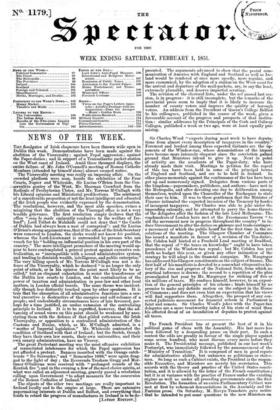Sir Charles Wood "expects during next week to have deputa-
tions from almost every description of taxpayers in the country." Sir Charles Wood "expects during next week to have deputa- tions from almost every description of taxpayers in the country."
Foremost and loudest among these expected visitants are- op- ponents of the 'Window-tax, whose denunciations of th impost have become more intensely eloquent since the conviction gained ground that Ministers intend to give it up. Next in point of activity are the assailants of the Paper-duty,- who have already made their visit. Meetings to petition for the repeal of this tax have been held in some of the principal towns of England and Scotland, and are to be held in Ireland.' In other places memorials against the continuance of the tax have been got up and numerously signed. Delegates from various parts Of the kingdom—papermakers, publishers, and authors—have met in the Metropolis, and after devoting one day to deliberation among themselves, waited upon the Chancellor of the Exchequer to state their case to him. It was to these gentlemen that the Minister' of Finance intimated the expected invasion of the Treasury by hordes of insurgent taxpayers. Sir Charles was able to joke under the impending calamity, and he attempted to parry the home-thrusts of the delegates after _the fashion of the late Lord Melbourne. The coaohmakers of London have met at the Freemasons Tavern "to aid the movement now in progress throughout the country" to in- duce Government to alter the duties on pleasure and trade oarriages a movement of which the public heard for the first time in the re- solutions of the meeting. The Glasgow Chamber of Commerce has issued a manifesto in favour of a revision of the Tea-duties. Mr. Cobden half hinted at a Freehold Land meeting at Bradford, that the repeal of " the taxes on knowledge" ought .to have taken precedence of the Window-tax repeal ; but Mr. Cobden has -put forth no budget this year, or given any other intimation of the strategy he will adopt in the financial campaign. Mr. Macgregor has addressed his Glasgow constituents on the subject of finance. The first half of his manifesto is devoted to a somewhat vituperative his- tory of the rise and progress of the National Debt, from which no tactical inference is drawn ; the second to a repetition of the plan promulgated last year by Mr. Macgregor for striking off live or six millions of taxes. He confines himself, however, to an exposi- tion of the general principles of his scheme ; binds himself by no promise to make any definite motion on the subject in the House of Commons ; and does not even hint an expectation that his views will find supporters there. Altogether, the prospect of any con- certed judicious movement for financial reform in Parliament is faint and remote. Sir Charles Wood's jokes with the Paper-tax delegates are a more trustworthy index of his state of mind than his affected dread of an inundation of deputies to protest against all taxes.


























